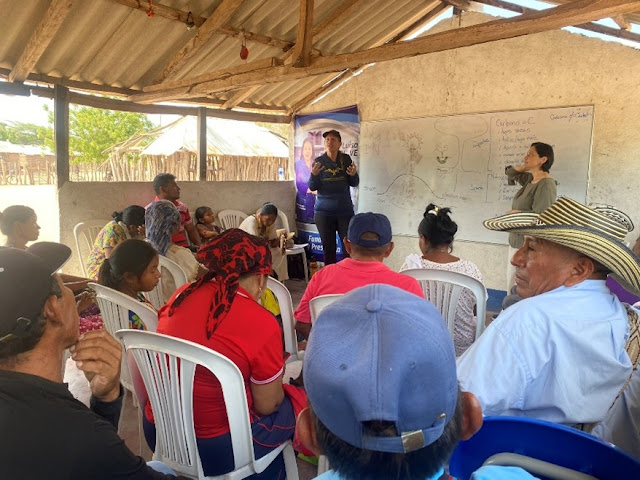World Water Day: Community Water Conservation and Education in the Wayuu Indigenous Community
I previously volunteered with Farmer-to-Farmer in the Dominican Republic, but this was my first assignment in Colombia. When I was contacted for a water quality focused assignment in northern Colombia, I was thrilled to accept the assignment. My assignment was to train schoolteachers and other members of the Wayuu indigenous community in water desalinization, water purification techniques, and other agricultural activities.
After an initial meeting with the local sponsoring organization, Fundación Maria Luisa, and teachers at the school, I was given a tour of typical vegetable, fruit, and livestock production. I was also shown sources of water which include shallow hand-dug wells, a few windmill or solar-powered community wells, and a nearby river. Access to clean and adequate quantities of water is always a struggle, particularly for rancherias further away from wells. During dry months, water is scarce and often has trace salts and other contamination issues. The community was very interested in learning practical water purification techniques, ways to conserve water, and ideas on how to increase food security.
Over the course of two weeks, I taught workshops to teachers and other community members on topics including: the water cycle, water conservation, source water protection, drought tolerant vegetables and fruit trees, small scale water distillation using a plastic bottle, building a bucket sand filter, other options for water treatment, and composting basics. We also had community members build new compost piles at the school and a nearby rancheria.
I have taught many courses and workshops throughout my 35+ year career but honestly, this community was the most engaging group I have ever worked with. I found the community extremely receptive to learning how to improve their water situation, grow crops more effectively, and start using compost in their gardens. They were very welcoming, and I appreciate how the whole group actively participated in all the workshops and demonstrations. We had many lively discussions, teachers got up and retaught lessons, just to make sure they fully understood concepts, and folks suggested options for working collectively to solve their problems. It was truly a heartwarming experience for me. At the end of my assignment, they extended an invitation for me to come back so I could see their progress.
On the final day, we met with students at the local university to share information about the Farmer-to-Farmer program and identify future opportunities to collaborate.
I did find time to fit in some fun on the weekend and day before I flew home. I visited a flamingo sanctuary where I took a boat ride out into a flock of flamingo and got to watch them feed and then take flight---wow. I also took a funicular ride to the top of Monserrate in Bogota and was treated to a beautiful view of the city and surrounding mountains.
Now that I am retired and have more time to volunteer, I hope to do more assignments for Farmer-to-Farmer. Being able to offer practical solutions to communities is very rewarding.
By Jan Surface, Water Specialist and Aquatic Ecologist




.png)

Comments
Post a Comment